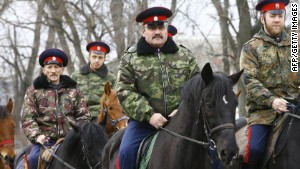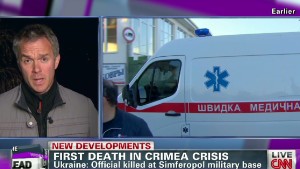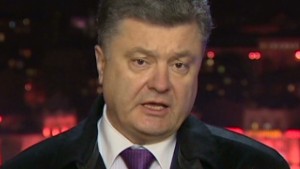Editor's note: Alexander J. Motyl is professor of political science at Rutgers University-Newark. He was associate director of the Harriman Institute at Columbia University from 1992 through 1998. A specialist on Ukraine, Russia and the former Soviet Union, Motyl is the author of six academic books and several novels, including "The Jew Who Was Ukrainian," "My Orchidia" and "Sweet Snow." He writes a weekly blog on "Ukraine's Orange Blues" for World Affairs Journal.
(CNN) -- Vladimir Putin's gala address before Russian parliamentarians and officials Tuesday surprised no one when he announced Russia's annexation of Crimea. The interesting part was his distorted view of Russian history, and his proclamation that a bizarre kind of simultaneously aggrieved and aggressive hyper-nationalism is now Russia's official ideology.
In discussing Ukraine, however, Putin seemed to go out of his way to suggest he had no aggressive intentions and was not planning to divide the rest of the country.
 Alexander J. Motyl
Alexander J. Motyl Listening to Putin, one could easily forget that Russia is and for many centuries has been the largest country in the world and that it acquired its territories by imperialist expansion often accompanied by genocide and ethnic cleansing.
Instead, Putin prefers to see Russia as having been permanently on the defensive, a victim of both Western and Communist machinations: "In a word, we have all the reasons to believe that the notorious policy of containing Russia, which was pursued in the 18th, 19th and 20th centuries, is continuing to this day.
"They are constantly trying to drive us into some corner, because we have an independent position, because we defend it, and because we call things by their names and are not hypocrites," he said.
After the Russian Revolution of 1917, according to Putin, it was the turn of the Bolsheviks to aggrieve Russia. Putin conveniently ignores that the vast majority of Bolsheviks were Russian and that the party Lenin founded was institutionally Russian as well. No matter.
 Could Putin 'walk back' Crimea crisis?
Could Putin 'walk back' Crimea crisis?  Ukraine cries 'robbery'
Ukraine cries 'robbery'  After Crimea, 'global security finished'
After Crimea, 'global security finished' Putin says: "The Bolsheviks, for a number of reasons -- may God judge them -- added large sections of the historical South of Russia to the Republic of Ukraine. This was done with no consideration for the ethnic makeup of the population, and today these areas form the southeast of Ukraine. Then, in 1954, a decision was made to transfer Crimean Region to Ukraine. ... What matters now is that this decision was made in clear violation of the constitutional norms that were in place even then."
Once again, Putin's historical myopia is breathtaking: Nikita Khrushchev's decision to grant Crimea to Ukraine was as constitutional as anything any Soviet Communist leader did in the entire period of the USSR's existence. The Soviet Union rested on illegality and the systemic violation of human and civil rights. If Khrushchev was wrong, then that's only because the USSR was wrong and should never have been created in the first place.
Unsurprisingly, there is no room in this narrative for the nation that Russian imperialism almost managed to annihilate -- the Crimean Tatars. Russia conquered the Crimean Tatar khanate in 1783. Afterward, the Russian authorities forced the Tatars out of their ancestral homeland and replaced them with settlers from Russia.
Tens of thousands of Tatars died or were killed; some two-thirds had to leave the Crimea. In 1944, the ethnic cleansing was completed when Stalin expelled the entire Crimean Tatar population -- about 200,000 people -- to Uzbekistan and some other Soviet regions. About half died on the way. It was only in the late 1980s that they began returning to their homeland to find that their land and their homes had been occupied by Russian settlers.
Instead, Putin primarily explains why Crimea matters to Russia: "The graves of Russian soldiers whose bravery brought Crimea into the Russian empire are also in Crimea. This is also Sevastopol -- a legendary city with an outstanding history, a fortress that serves as the birthplace of Russia's Black Sea Fleet ... symbolizing Russian military glory and outstanding valor."
And what of the Crimean Tatars? Here's Putin: "True, there was a time when Crimean Tatars were treated unfairly, just as a number of other peoples in the USSR. There is only one thing I can say here: Millions of people of various ethnicities suffered during those repressions, and primarily Russians."
The mendacity is astounding. The Crimean Tatars were not just "treated unfairly" by some vague force. They were subjected to genocide by a Russian totalitarian empire. Russians also "suffered," but the brunt of the suffering fell, as Yale historian Timothy Snyder describes in "Bloodlands," on Poles and Ukrainians.
Despite all this victimization, Putin's speech loudly asserts that Russia is back: It's mad as hell and it won't take being humiliated anymore. This Russia, the new Russia, is both victim and bully:
"Today it is imperative to end the hysterics and to renounce the rhetoric of the 'Cold War,' and to recognize an obvious thing: Russia is an independent and active participant in international life, and it has, like other countries, its national interests, which must be acknowledged and respected."
And then, remarkably, Putin adopts a conciliatory tone with respect to Ukraine. Naturally, he first denounces the new democratic government as illegitimate and in the thrall of imaginary fascists and asserts Russia's obligation to help defend Russians and Russian speakers from their supposed assaults and predations.
Here's the soft and fuzzy Putin:
"I appeal to the people of Ukraine. I sincerely want you to understand us: Under no conditions do we wish to bring you harm, to insult your national feelings. We have always respected the territorial integrity of the Ukrainian state. ...
"Don't believe those who terrify you with Russia, who shout that other regions will follow Crimea. ... We want Ukraine to be a strong, sovereign and self-sufficient state. ... We want peace and amity to come to the land of Ukraine, and together with other countries we are ready to provide full cooperation and support to that end. But I repeat: Only the citizens of Ukraine are able to bring order to their own home."
If these words were sincere, then they may mark a significant departure from the war-mongering rhetoric Putin employed at his March 4 press conference, where he stated he "wasn't worried" by war with Ukraine. Indeed, if sincere, Putin has clearly stated that he will not invade the rest of Ukraine and attempt to annex some of its southeastern provinces.
Is Putin being truthful, or is the speech a smoke screen for further aggression? We don't know, of course, but now that Putin has gone on record as having nothing but peaceful intentions toward Ukraine, the international community would do well to remind him of that whenever the temptation to rattle sabers on Ukraine's borders and foment trouble in Ukraine's southeast proves too strong for him to resist.
Follow us on Twitter @CNNOpinion.
Join us on Facebook.com/CNNOpinion.
{ 0 comments... read them below or add one }
Post a Comment